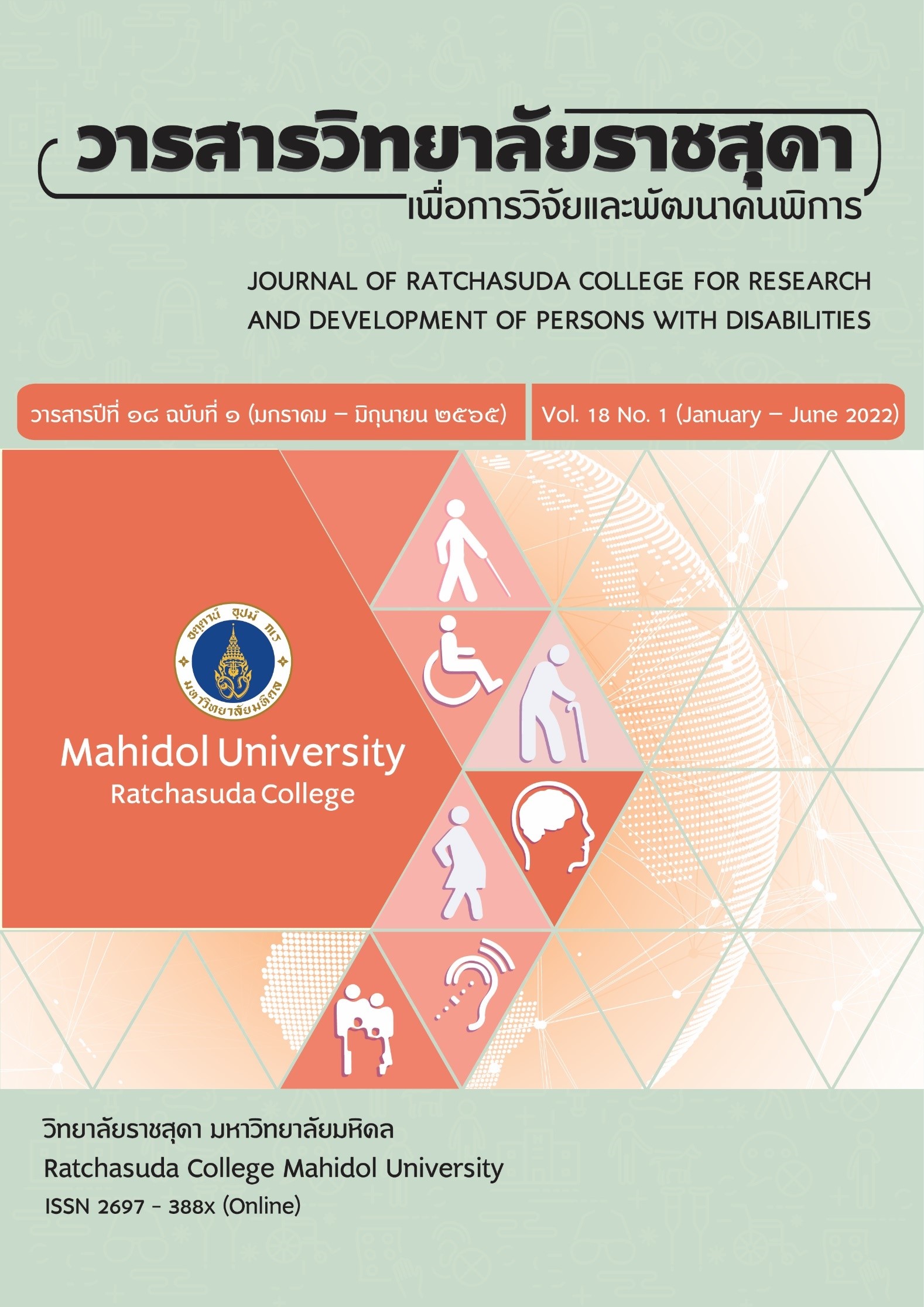The process of parent-paraprofessionals collaboration in using assistive technology to develop eating skill of the child with Patau Syndrome
Keywords:
Collaboration, Parent-Paraprofessionals, Eating Skill, Patau Syndrome, Assistive TechnologyAbstract
This research aimed to study the process of collaboration between parents and paraprofessionals in developing eating skill of the child with Patau Syndrome, and to study the result of parent and paraprofessional collaboration that affected on the increase of parent's teaching skills, the adjustment of assistive technology and the increase of eating skill of the child with Patau Syndrome. The target group was selected by purposive sampling that included a child with Patau Syndrome, the parent (mother), and paraprofessional. The tools that were used were 1) behavior record form of collaboration between parent and paraprofessional 2) assessment form of facilities 3) assessment form of eating skill 4) parent’s teaching behavior observation form 5) eating behavior observation form for parent to use after the teaching session 6) four teaching plans for parent and 7) 4 individual teaching plans. The author took 5 weeks for research process and analyzed data by mean and description. The result was found that collaboration among parent and paraprofessionals in developing eating skill of the child with Patau Syndrome has steps as following 1) co-thinking and making decisions that collaborated from paraprofessionals 2) coordinated power of thinking among paraprofessionals and parent 3) collaboration in practice and result evaluation that leads to mutual goals and 4) co-benefits. Moreover, the quantitative research results were 1) parent’s teaching behavior score was at highest level 2) eating skill of the child with Patau Syndrome, after the teaching by parent, was at excellent level 3) the adjustment of assistive technology was at highest level. According to the research, it can be concluded that the process of collaboration among parents and paraprofessionals has affected parent’s perception and understanding towards the child’s struggles, including her own roles. Furthermore, the support from paraprofessionals empowered the parent to realized that she can improve her daughter’s eating skills through her training provision together with the adjustment and using an appropriate table designed by parents and paraprofessionals became the guideline for solving problems. Apart from that, the activity table was suitable for assisting in learning eating skill of the child with Patau Syndrome.
Downloads
References
Boonyakarn, T. (2016). The development of learning experience management with parental involvement model to enhance the self-help skills of children with cerebral palsy. (Doctoral dissertation). Srinakharinwirot University, Bangkok, Thailand.
Bronfenbrenner, U. (1994). Ecological models of human development. International Encyclopedia of Education, 2(3), 39.
Chonpracha, S. (2014). The development of instruction to strengthen nature self-directed learning of graduate students community development program department of education, Prince of Songkla University. (Master’s thesis). Prince of Songkla University, Songkla, Thailand.
Chumchuen, T. (2018). The effects of using a training package with parental involvement on self-help skill in toilet training of children with moderate intellectual disability. (Master’s thesis). Srinakharinwirot University, Bangkok, Thailand.
Cohen, J. M. & Uphoff, N. T. (1980). Participation's place in rural development: Seeking clarity through specificity. World Development, 8(3), 213-235.
Education Center. (2018). Summary work of adjusting the home to the classroom, turning parents into teachers academic year 2018. Lampang: Lampang Special Education Center.
Harding, J. V. (2016). Collaboration with parents of students of students with down syndrome: Parental perspectives and leadership implications. (Master’s thesis). Fordham University, New York, United States.
Jarunondrakul, S. & Tongsookdee, R. (2019). Overprotection: Obstacles to the potential development of children with multiple disabilities. Sikkhana, 7(8), 15.
Korsuwan, K. (2010). Intellectual disabilities. Bangkok: Srinakharinwirot University, Lampang Special.
Office of the Education Council. (2017). National education plan 2017-2036. Bangkok: Prigwhan Graphic Company.
Rattanasakorn, S. (n.d.). Manual for teaching students with visual impairment and multiple disability. Bangkok: Special Education Bureau.
Sirindhorn National Medical Rehabilitation Institute. (2019). Clinical practice guidelines: Dysphagia. Nontaburi: Sahamitr Printing & Publishing Company.
Special Education Bureau. (2016). Assessment report adapt home to classroom and change parents to teachers 2016. Bangkok: Special Education Bureau.
Thorndike, E. L. (1923). Education a first book. New York: Macmillan Company.
Udompanich, N. (2014). Occupational therapy: Dysphagia. Khon Kaen: Khon Kaen University.
Vittayakorn, S. (n.d.). Rehabilitation in feeding activities for children with cerebral palsy. Chiang Mai: Chiang Mai University.
Downloads
Published
How to Cite
Issue
Section
License
Copyright (c) 2022 JOURNAL OF RATCHASUDA COLLEGE FOR RESEARCH AND DEVELOPMENT OF PERSONS WITH DISABILITIES

This work is licensed under a Creative Commons Attribution-NonCommercial-NoDerivatives 4.0 International License.
บทความที่ได้รับการตีพิมพ์เป็นลิขสิทธิ์ของวารสารสถาบันราชสุดาเพื่อการวิจัยและพัฒนาคนพิการ






